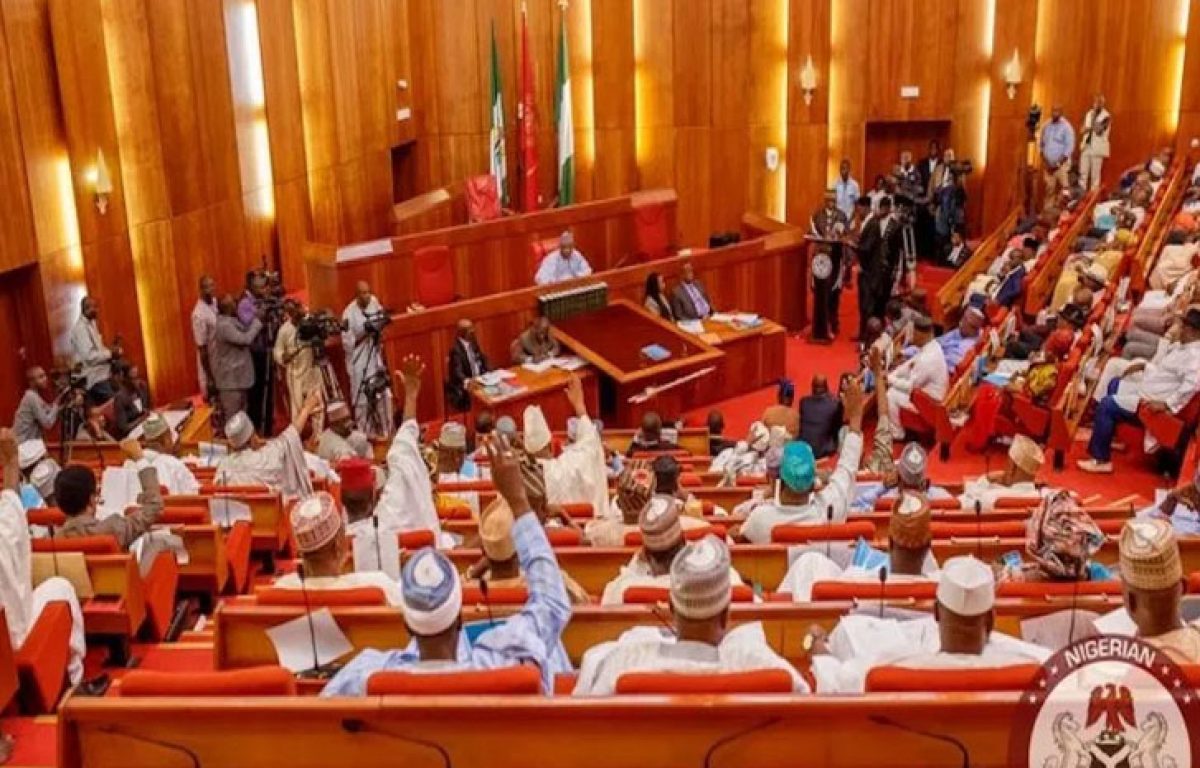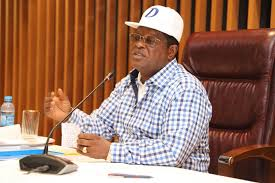Business
FAAC: FG, States, LGs share N415bn April Allocation
By Joseph INOKOTONG
The Federation Account Allocation Committee (FAAC) Tuesday shared N415.730 billion to the three tiers of government being April 2017 allocation.
Accountant –General of the Federation, Ahmed Idris, who represented the Minister of Finance, Mrs. Kemi Adeosun said the gross statutory revenue of N274.210 billion received for the month, was lower than the N331.583 billion received in the previous month by N57.473 billion.
She said there was a significant increase in Export Sales Revenue by about $63.69 million due to increase in the average unit price of crude from $55.86 to $55.38 per barrel and a rise in crude oil export volume by 1.07 million barrels.
According to the Minister, the Federal Government received N136.633 billion; state governments got N103.842 billion, while the local governments received N77.112 billion including the Value Added Tax (VAT).
The Federal Inland Revenue Service, FIRS received 4 percent Cost of Collection from the N56.562 billion generated for the month. Nigeria Customs Service also took 7 percent cost of collection from the N43.468 billion generated in April 2017. The Department of Petroleum Resources also got its 4 percent cost of collection from the N36.115 billion generated for the month. The oil producing states received N22.640 billion being 13 percent derivations.
“However, despite the improvement, production still suffered the potential setbacks. Leakages arising from sabotage and program maintenance led to shut-ins and shutdowns at terminals. The force majeure declared at Forcados terminal since February, 2016 was still in place”, she said.
The distributable statutory revenue for the month was N272.115 billion. The sum of N6.330 billion was refunded by the Nigeria National Petroleum Corporation (NNPC) to the Federal Government.
There was a proposed distribution of N20.425 billion from excess petroleum profit tax (PPT) account. Also, exchange gain of N38.517 billion was proposed for distribution.
The chairman of State Commissioners of Finance Forum, Mr. Mahmood Yunusa said, states were worried that the money shared would not be enough to enable them pay workers’ salaries, stressing “we expect that by next month there should be a remarkable improvement.”
Meanwhile, the Excess Crude Account balance dropped to $2.29 billion on May 23 from $2.49 billion on April 25.
Alhaji Idris, also stated that the allocations from the Federation Account to the three tiers of government also declined by N52. 07 billion from the N467.8 billion shared in March to N 415.73 billion in April this year.
Similarly, a decrease of N57.47 billion was also recorded in gross statutory revenue from N331.58 billion in March to N274.1 billion in April.
Mr. Idris explained further that the Federal Government received N163.89 billion while states and the 774 local government councils received N117.59 billion and N87.77 billion, respectively.
Meanwhile, N29.83 billion was shared to the oil-producing states based on the 13 per cent derivation principle, while the revenue- generating agencies received N16.52 billion as cost of revenue collection.
According to Mr. Idris, the decrease in revenue to crude oil production setbacks was caused by sabotage and shutdown of installations, especially in the Niger Delta region.
“Despite the improvement (in prices of crude oil), production still suffered the perennial setbacks,” he said.
Business
Senate Committee Commends Tinubu on Launch of National Halal Economy Strategy to Tap $7.7trn Global Market*

The Senate Committee on Finance has commended President Bola Ahmed Tinubu for launching Nigeria’s National Halal Economy Strategy, describing it as a bold and strategic move to position the country within the lucrative global halal market, estimated at $7.7 trillion.
In a statement signed by its Chairman, the committee praised the initiative as timely and aligned with international best practices. Several countries—including the United Kingdom, Canada, Australia, Malaysia, Indonesia, Saudi Arabia, the United Arab Emirates, Turkey, Brazil, Thailand, and Singapore—have successfully used halal frameworks to boost manufacturing, agricultural exports, financial markets, and foreign investment.
The committee highlighted Nigeria’s strong advantages for success in this space, including its vast agricultural resources, large domestic market, youthful population, growing manufacturing sector, and expanding services industry.
It noted that the strategy fits seamlessly into the Tinubu administration’s broader economic reforms, such as boosting non-oil revenue, diversifying exports, creating jobs, supporting small and medium enterprises (SMEs), and increasing foreign exchange earnings.
President Tinubu, represented by Vice President Kashim Shettima, officially unveiled the strategy on Thursday, February 6, 2026, at the Presidential Villa in Abuja.
The framework, developed in collaboration with Saudi Arabia’s Halal Products Development Company (HPDC) following a bilateral agreement signed in February 2025 at the Makkah Halal Forum, aims to enhance quality standards, certification processes, and competitiveness across sectors like food, pharmaceuticals, cosmetics, tourism, and ethical finance.
The committee described the strategy as inclusive, market-driven, and globally oriented, while fully respecting Nigeria’s diverse and pluralistic society.
It is projected to contribute significantly to the economy, with estimates suggesting it could add around $1.5 billion to Nigeria’s GDP by 2027 and unlock billions more in domestic value over the coming decade through expanded exports and investment.
The Senate Committee on Finance pledged its full legislative support, oversight, and cooperation to ensure smooth implementation, regulatory clarity, and long-term fiscal sustainability in the national interest.
“This decisive step reinforces Nigeria’s readiness to adopt proven international models, unlock new economic frontiers, and establish itself as a competitive player in the evolving global economy,” the statement concluded.
Business
Ex-Naval Chief Named in ₦100m Property Transaction Dispute
A property transaction dispute has emerged involving Zoe New Dawn Nigeria Limited and a former Chief of Naval Staff, following claims by the company’s chairman, Engr. Dr. Stephen Achema Akpa, that a ₦100 million payment made for land was not followed by a transfer of ownership.

According to Akpa, the payment was made in connection with a land transaction reportedly facilitated by the former naval chief. He alleged that despite documented payments, the land in question was neither transferred to the company nor was the money refunded.
Akpa said Zoe New Dawn Nigeria Limited possesses transaction records and related documents which, he claims, support its position in the dispute. He added that the company has initiated steps to seek redress through appropriate legal channels.
The matter has drawn attention due to the profile of the parties involved, particularly against the backdrop of recurring disputes linked to land ownership and property transactions in Nigeria’s real estate sector.
Industry observers note that unresolved land transactions remain a common source of litigation, often arising from disagreements over title documentation, intermediaries, and contractual obligations.
Zoe New Dawn Nigeria Limited stated that it intends to pursue the matter through lawful means to determine liability and recover any funds deemed outstanding.
As of press time, no official response had been issued by the former Chief of Naval Staff regarding the allegations. The dispute has not yet been confirmed as the subject of any court proceedings.
Business
Umahi Inspects Lekki Corridor’s 7th Axial Road Project, Expresses Confidence in CHEC

Minister of Works Senator Dave Umahi over the weekend inspected the progress of the 7th Axial Road project in the Lekki Corridor of Lagos.
The project, located behind the Dangote Refinery, is a crucial cargo handling route for the Lekki Deepwater Port and connects the Lekki Corridor with the Sagamu route.
The Minister expressed confidence in China Harbour Engineering Company Limited (CHEC), the project’s contractor, citing its successful delivery of the Lekki Deepwater Port and high-quality progress on the Makurdi-Enugu road reconstruction and expansion project. Umahi instructed that the roadbed filling work for Project LOT1 be completed by the end of April and directed the project team to accelerate resource input and tangible works to meet the deadline.
The 7th Axial Highway is expected to synergize with key infrastructure projects like the Coastal Road, Dangote Road, and Lekki Port, creating a comprehensive transportation hub model and boosting Nigeria’s port economy and industrial corridor. Umahi emphasized the need for environmental protection agencies to ensure efficient construction and steady progress while maintaining ecological safety.
A representative of CHEC who spoke during the inspection stated that the company would maintain a high level of resource input, implement the Minister’s directives, and coordinate safety, quality, and environmental protection to ensure the project’s timely and high-quality completion in other to unluck its port relief and regional economic benefits.
-

 Uncategorized5 years ago
Uncategorized5 years agoFG, states urged to harness flooding for ranching, others with technology – Agbaje
-

 Headlines10 years ago
Headlines10 years agoBreaking: EFCC seals Borno House of Assembly, as Hon members take to their heels
-

 News12 years ago
News12 years agoNigeria Security Operatives Stage Manhunt For Homosexual Perpetrator
-

 News9 years ago
News9 years agoHow 21-year-old Girl fled community over accusation of lesbianism
-

 News10 years ago
News10 years agoYobe Gov Moves Against Deputy
-

 Opinion7 years ago
Opinion7 years ago7 signs she has friend zoned you
-
Technology4 years ago
Online job placement company headhunts women
-

 Headlines10 years ago
Headlines10 years agoBorno Dep Gov Abducts Another Church Leader





